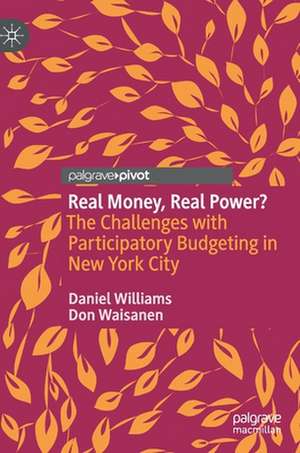Real Money, Real Power?: The Challenges with Participatory Budgeting in New York City
Autor Daniel Williams, Don Waisanenen Limba Engleză Hardback – 29 oct 2020
Preț: 383.33 lei
Nou
Puncte Express: 575
Preț estimativ în valută:
73.36€ • 76.31$ • 60.56£
73.36€ • 76.31$ • 60.56£
Carte tipărită la comandă
Livrare economică 14-28 aprilie
Preluare comenzi: 021 569.72.76
Specificații
ISBN-13: 9783030592004
ISBN-10: 3030592006
Pagini: 112
Ilustrații: XI, 112 p. 4 illus., 3 illus. in color.
Dimensiuni: 148 x 210 mm
Greutate: 0.3 kg
Ediția:1st ed. 2020
Editura: Springer International Publishing
Colecția Palgrave Macmillan
Locul publicării:Cham, Switzerland
ISBN-10: 3030592006
Pagini: 112
Ilustrații: XI, 112 p. 4 illus., 3 illus. in color.
Dimensiuni: 148 x 210 mm
Greutate: 0.3 kg
Ediția:1st ed. 2020
Editura: Springer International Publishing
Colecția Palgrave Macmillan
Locul publicării:Cham, Switzerland
Cuprins
Chapter 1: Introduction: Real Money, Real Power?.- Chapter 2: Participatory Budgeting from the Past to the Present.- Chapter 3: The Challenges of Neighborhood Assemblies.- Chapter 4: The Challenges of Delegate Meetings.- Chapter 5: The Challenges of Project Expos and Pop-Up Voting.- Chapter 6: Conclusion: Doing Participatory Budgeting Right.
Notă biografică
Daniel Williams has been with Baruch College since 1995 where he teaches budgeting, performance measurement, and ethics. Prior, he was the budget director for the Virginia Department of Medical Assistance Services (Medicaid). Williams has previous studies of New York City Participatory Budgeting with Thad Calabrese and Anubhav Gupta in Administration and Society and of a New York City discretionary spending with Yonghong Wu in the Journal of Public Budgeting, Accounting, and Financial Management.
Don Waisanen is a Professor in the Baruch College, CUNY Marxe School of Public and International Affairs, where he teaches courses and workshops in public communication—including executive speech training, communication strategy, and seminars on leadership, storytelling, and conflict management. All his research projects seek to understand how communication works to promote or hinder the force of citizens’ voices.
Don Waisanen is a Professor in the Baruch College, CUNY Marxe School of Public and International Affairs, where he teaches courses and workshops in public communication—including executive speech training, communication strategy, and seminars on leadership, storytelling, and conflict management. All his research projects seek to understand how communication works to promote or hinder the force of citizens’ voices.
Textul de pe ultima copertă
New York City has the largest council-sponsored Participatory Budgeting (PB) processes in North America. From its inception in Brazil, PB was a process that empowered the least-advantaged members of the community by providing a way to propose budget allocations through voting. This book reports on a multi-methodological study of New York City’s participatory budgeting (PB) process from the perspective of a city resident over time. A participatory budgeting slogan purports that the initiative offers “real power” and “real money” to constituents at a local level. To critically examine such top-down assertions, and different than much that has been written about PB, this book researches and navigates its events the way a member of the community would see it. The study reveals a lack of transparency, manipulation by city agencies, the favorable treatment of insider proposed projects, and a failure to reveal the basis of project costs. It also finds that there is no singular participatory budgeting project in New York City. Instead, there are numerous participatory budget projects, as many as there are council members who engage in the practice. This book provides a ground-level view of these limitations and recommends substantial reform.
Caracteristici
Offers an investigative, behind-the-scenes look at New York City's participatory budgeting (PB) process, which takes readers through an entire annual cycle Provides a clear account of issues related primarily to transparency, manipulation, and favoritism that are not commonly acknowledged in the PB literature Provides a critical review of the experience of the asserted beneficiaries of participatory budgeting and reveals a variety of barriers to actually achieving those benefits Recommends substantial reform, specifically as it pertains to a lack of transparency, manipulation by city agencies, favorable treatment of insider proposed projects, and a failure to reveal the basis of project costs
